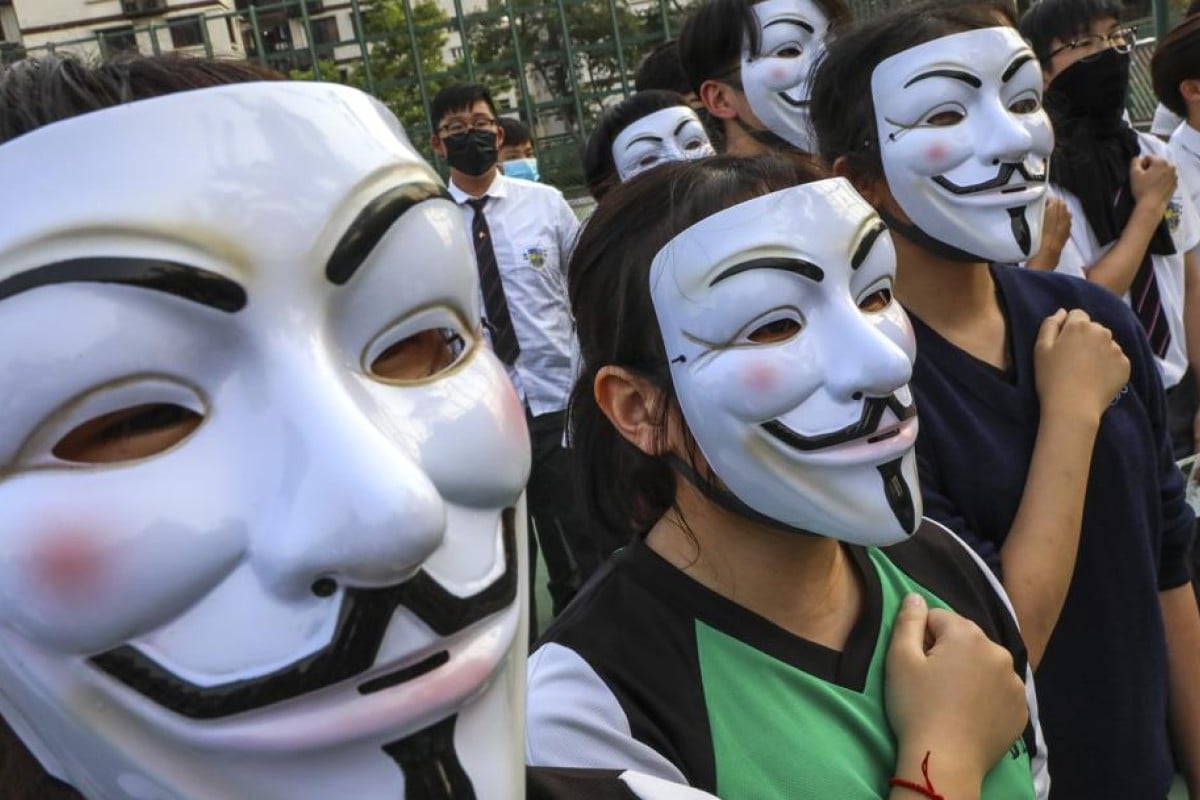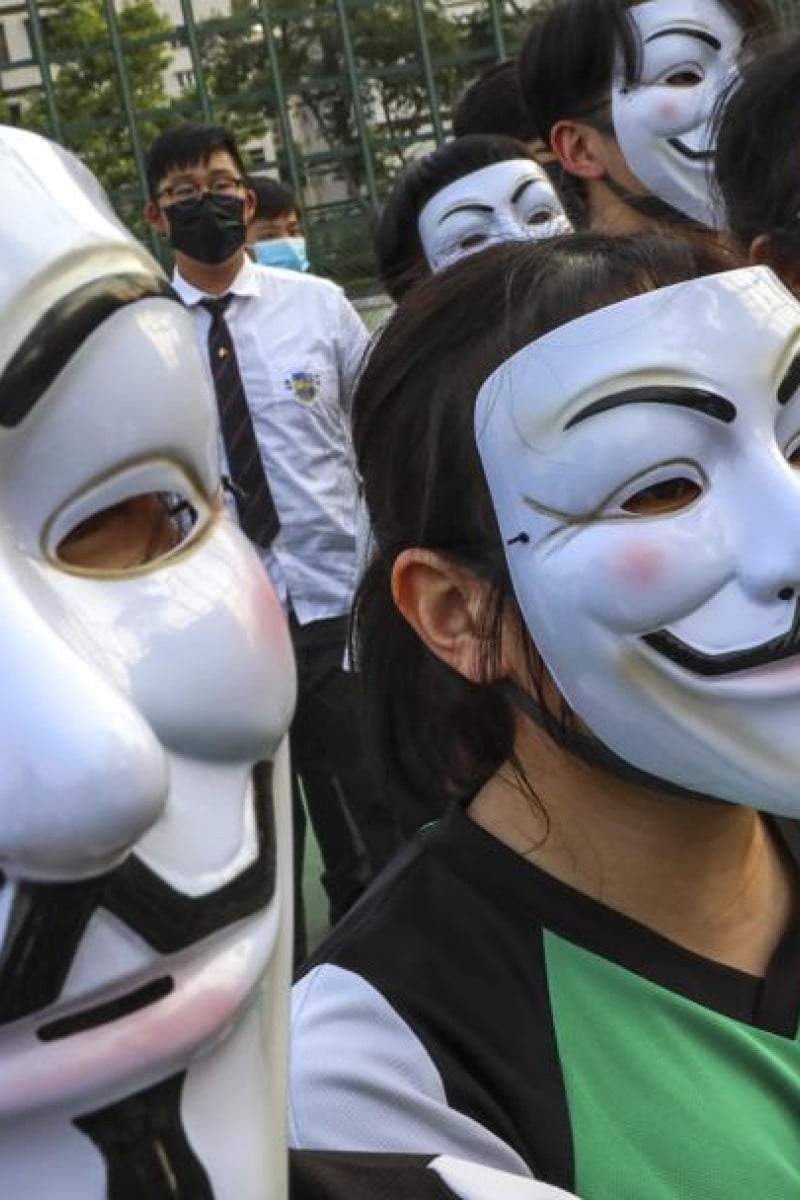 Students from different schools in Kowloon Tong hold a protest while wearing 'V for Vendetta' masks. The movie has resonated with a lot of Hongkongers, and slogans from the film can be seen spray painted around the city.
Students from different schools in Kowloon Tong hold a protest while wearing 'V for Vendetta' masks. The movie has resonated with a lot of Hongkongers, and slogans from the film can be seen spray painted around the city.When the Hong Kong government announced a ban on wearing masks on October 4, they said it was to quell the wave of protests in the city. But many said the move was a case of “adding fuel to the fire”, as the following day, the streets in the city were filled with protesters defiantly covering their faces.
Many chose to wear the Guy Fawkes mask from the 2005 film V for Vendetta. This isn’t the first time the political thriller has been referenced by Hong Kong’s protesters: many have taken to carrying cardboard signs that read quotes from the film such as “People shouldn’t be afraid of their government. Governments should be afraid of their people” during marches, while “V” symbols can also be seen graffitied on walls around the city.
What is it about this film that resonates so strongly with some protesters? We dig deeper into the movie to find out.
Who is Guy Fawkes?
Fawkes is a well-known figure in British history, thanks to his role in the failed Gunpowder Plot of 1605.
He belonged to a group of Catholics in the country who did not like the Protestant king or government. They felt that they were being persecuted for their religion.
The group came up with a plan to blow up England’s Houses of Parliament – the place where the country’s lawmakers meet – and kill King James I on November 5.
Students react to face mask ban
Fawkes was in charge of setting off the gunpowder in an underground cellar beneath Parliament. But authorities were tipped off about the plan, and went to search the building. They found Fawkes guarding the explosives. He was questioned and tortured for days, until he finally confessed to the plot.
Each year on November 5, people in Britain light bonfires and burn effigies of Fawkes to celebrate the King’s lucky escape.
More recently, however, Fawkes has become a symbol of anarchism. V, the main character in V for Vendetta, embodies this symbol by wearing a Guy Fawkes mask.
Is V a hero or a terrorist?
Hugo Weaving, the actor who plays V, has argued that the words “terrorist” and “terrorism” are barriers to understanding the reasons why people do things.
“[We can’t just say that] they’re terrorists and we’re freedom fighters, or they’re terrorists and we’re upholders of democracy. It’s completely unhelpful” he said in an interview with IESB.net.
Students hold rally at HKU to condemn mask ban
When asked to describe V, Weaving says he sees him as a very complex character. On one hand, he’s a representation of the ideas that are at the heart of the film. But he’s also a damaged person, someone who has been tortured by the government and is out to get revenge.
“So he’s a very dark avenging angel if you like, or just a vengeful force,” Weaving said. “He’s also a force for hope and somebody that embodies this idea that the government should be responsive to the people that it represents.”
Why does V never unmask himself?
“Normally, you’d expect in a film like this … that the masked man will be revealed at some point,” said Weaving in the IESB.net interview. “But he’s not, for a very simple reason: the ideas are more important than the man, more important than the individual.”
Weaving’s explanation echoes a quote from V in the original graphic novel by Alan Moore: “Behind this mask there is more than just flesh. Beneath this mask there is an idea … and ideas are bulletproof.”
How else does the film borrow from history?
Another example of the film taking inspiration from real-life events is its villain, the dictatorial High Chancellor Adam Sutler. In the original graphic novel, the character’s last name was Susan, but the filmmakers changed it to Sutler to incorporate the name of another famous dictator: Hitler.
This historical connection felt all too real for actor John Hurt, who played Sutler in the film, as many of his scenes were shot on location in Berlin, Germany.
“It was strange behaving like Hitler,” Hurt said in an interview with entertainment website The A.V. Club. "Some of the locations were exactly where he gave speeches.”
How to talk to someone with different political views without getting nasty
What is the significance of the character Evey?
Evey, who is played by actor Natalie Portman, is a young woman who becomes radicalised by her personal experiences of suffering.
Her mistreatment includes having her head shaved – an experience Portman agreed to undergo live on set to make the scene as realistic as possible.
“Obviously, for the character, it’s a very traumatic experience because it’s a violence committed upon her,” Portman said in a video interview in 2006, while promoting the film. “But for me, I got to choose to do it so I didn’t feel like a violence against me.”
“It was actually kinda wonderful to throw vanity away for a little bit,” she added.

